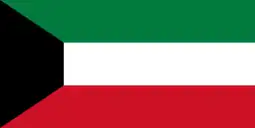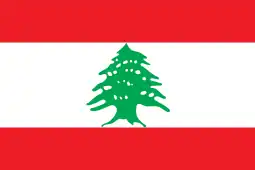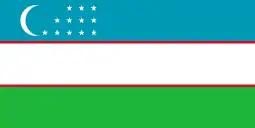| |
|---|---|
 | |
| Tournament details | |
| Host country | Lebanon |
| Dates | 12–29 October |
| Teams | 12 |
| Venue(s) | 3 (in 3 host cities) |
| Final positions | |
| Champions | |
| Runners-up | |
| Third place | |
| Fourth place | |
| Tournament statistics | |
| Matches played | 26 |
| Goals scored | 77 (2.96 per match) |
| Attendance | 276,488 (10,634 per match) |
| Top scorer(s) | |
| Best player(s) | |
| Best goalkeeper | |
| Fair play award | |
The 2000 AFC Asian Cup was the 12th edition of the men's AFC Asian Cup, a quadrennial international football tournament organised by the Asian Football Confederation (AFC). The finals were held in Lebanon between 12 and 29 October 2000. Japan defeated defending champion Saudi Arabia in the final match in Beirut. The official mascot was Nour, a Sparrow that represented peace, since Lebanon has a civil war years before the tournament, was created by 23-year-old Lebanese designer Ali Baasiri, who also designed the competition's logo, the mascot is a brightly coloured sparrow that is common to the Arab world.
"Nour in Arabic means light," says Baasiri, who is studying graphic design at the American University of Beirut. "It's easily pronounced by both Arabic speakers and speakers of other languages. Nour is the light that comes out of the quantum leap. It's the light of the new dawn, the light of the new millennium.
"Both the logo and the mascot represent the rebirth of Lebanon coming out of war and also coming into the new millennium. It also represents a new beginning in sport and in football, because technology is really affecting sports and everything is changing.
"I chose a bird because Lebanon does not have a distinctive animal unique to it, there's nothing like the kangaroo in Australia. The bird is a Doury, a grey sparrow that is very common in the Arab world. The bird is a very active bird, which I thought was significant. I chose it because of its wings. The mascot doesn't have hands, hands are not significant in football and I didn't want to limit myself to having hands. I thought the wings expressed far more.
"I think the people of Lebanon will like the mascot, they want to see something friendly and colourful."
Nour is designed to work in tandem with the official Asian Cup Lebanon 2000 logo both visually and conceptually. The latter was unveiled last year. Dusan Uhrin
"The logo is a circle," says the designer. "It's 45 minutes of football plus the 15 minute break. I chose Arabic typography to fill the break; the red part is really Lebanon in Arabic. The word for Lebanon circles a football, which is the focus of the logo, and of course the tournament."
Qualification
42 teams participated in a preliminary tournament. It was divided into 10 groups and the first-placed team of each group thus qualified. A total of 84 games were held, starting with the Oman versus Kyrgyzstan game on 3 August 1999.
The 12 qualifying teams were:
Notes:
- 1 Bold indicates champion for that year
- 2 Italic indicates host
Stadiums
| Beirut | Sidon | Tripoli | |
|---|---|---|---|
| Sports City Stadium | Saida Municipal Stadium | International Olympic Stadium | |
| Capacity: 47,799 | Capacity: 22,600 | Capacity: 22,400 | |
.png.webp) |
 |
 | |
Squads
Tournament summary
Lebanon participated in the country's first ever football competition in the history as host, but began disappointingly, losing 0–4 to mighty Iran. Lebanon sought to reinvigorate the team against Iraq and Thailand, but all ended up in just draws, and Lebanon finished bottom in the group, the first host nation since Qatar 1988 to not progress from the group stage. Iran and Iraq managed to survive in the group A with seven and four points respectively, and Thailand took the third, but did not progress due to inferior points, having won no match in their group. Group B saw South Korea failed to achieve a top two finish, falling behind group winner China and Kuwait, but qualified as the best third place team, with the team's only win was against Indonesia. Indonesia was the only team to not score a single goal in the tournament, being beaten by South Korea and China, and a goalless draw with Kuwait. Group C witnessed Uzbekistan to become the worst-performed team in the tournament, being heavily beaten 1–8 by Japan and 0–5 by defending champions Saudi Arabia. The Japanese scrambled to top the group with a famous 4–1 win over the Saudis, though Saudi Arabia would go on to progress together after an unpromising group stage performance. Qatar, another participant in the group, finished in third and progressed thanked for one point ahead of Thailand, having drawn in all three matches.
The quarter-finals saw Iran lost 1–2 to South Korea by a golden goal of Lee Dong-gook, and the same happened in Saudi Arabia's victory over Kuwait, also by a golden goal of Nawaf Al-Temyat. China and Japan easily passed through their Arab rivals Qatar and Iraq, with 3–1 and 4–1 wins respectively, to set up an entirely East Asian affair in the semi-finals, with Saudi Arabia being the only non-East Asian team to be here.
The first semi-finals saw Saudi Arabia sealed the victory over the South Koreans, with two goals by Talal Al-Meshal at 76' and 80' meant Lee Dong-gook's late equalizer was too little, too late. Japan beat China in a thriller in Beirut, 3–2, to once again face the Saudis in the final. In the third place match, South Korea won bronze with a 1–0 win over China.
The final in Beirut was filled with majority of Saudi supporters, and was seen as the rematch of the 1992 final and earlier group stage encounter. Hamzah Idris had a chance to take the Saudis ahead of Japan at 10', but he missed the opportunity. Eventually, the missing penalty was what the Saudis regretted the most, because Shigeyoshi Mochizuki, who had accidentally given the Saudis the failed opportunity on the penalty earlier, became the hero of Japan with a goal in 30'. Saudi attempt proved to be fruitless, and Japan won the game by just one goal margin, to conquer its second Asian trophy, repeating Japan's victory over Saudi Arabia eight years ago. Subsequently, Japan, the winner, automatically qualified for the 2004 AFC Asian Cup.
First round
All times are Lebanon summer time (UTC+3).
Group A
| Pos | Team | Pld | W | D | L | GF | GA | GD | Pts | Qualification |
|---|---|---|---|---|---|---|---|---|---|---|
| 1 | 3 | 2 | 1 | 0 | 6 | 1 | +5 | 7 | Advance to knockout stage | |
| 2 | 3 | 1 | 1 | 1 | 4 | 3 | +1 | 4 | ||
| 3 | 3 | 0 | 2 | 1 | 2 | 4 | −2 | 2 | ||
| 4 | 3 | 0 | 2 | 1 | 3 | 7 | −4 | 2 |
Group B
| Pos | Team | Pld | W | D | L | GF | GA | GD | Pts | Qualification |
|---|---|---|---|---|---|---|---|---|---|---|
| 1 | 3 | 1 | 2 | 0 | 6 | 2 | +4 | 5 | Advance to knockout stage | |
| 2 | 3 | 1 | 2 | 0 | 1 | 0 | +1 | 5 | ||
| 3 | 3 | 1 | 1 | 1 | 5 | 3 | +2 | 4 | ||
| 4 | 3 | 0 | 1 | 2 | 0 | 7 | −7 | 1 |
| South Korea | 2–2 | |
|---|---|---|
| Lee Young-pyo Noh Jung-yoon |
Report | Su Maozhen Fan Zhiyi |
| South Korea | 0–1 | |
|---|---|---|
| Report | Al-Huwaidi |
| South Korea | 3–0 | |
|---|---|---|
| Lee Dong-gook |
Report |
Group C
| Pos | Team | Pld | W | D | L | GF | GA | GD | Pts | Qualification |
|---|---|---|---|---|---|---|---|---|---|---|
| 1 | 3 | 2 | 1 | 0 | 13 | 3 | +10 | 7 | Advance to knockout stage | |
| 2 | 3 | 1 | 1 | 1 | 6 | 4 | +2 | 4 | ||
| 3 | 3 | 0 | 3 | 0 | 2 | 2 | 0 | 3 | ||
| 4 | 3 | 0 | 1 | 2 | 2 | 14 | −12 | 1 |
| Saudi Arabia | 1–4 | |
|---|---|---|
| Morioka |
Report | Yanagisawa Takahara Nanami Ono |
| Qatar | 1–1 | |
|---|---|---|
| Gholam |
Report | Qosimov |
| Japan | 8–1 | |
|---|---|---|
| Morishima Nishizawa Takahara Kitajima |
Report | Lushan |
| Saudi Arabia | 0–0 | |
|---|---|---|
| Report |
| Saudi Arabia | 5–0 | |
|---|---|---|
| Al-Otaibi Al-Shalhoub Al-Temyat |
Report |
| Japan | 1–1 | |
|---|---|---|
| Nishizawa |
Report | Al-Obaidly |
Third-placed qualifiers
At the end of the first stage, a comparison was made between the third placed teams of each group. The two best third-placed teams advanced to the quarter-finals.
| Pos | Team | Pld | W | D | L | GF | GA | GD | Pts | Qualification |
|---|---|---|---|---|---|---|---|---|---|---|
| 1 | 3 | 1 | 1 | 1 | 5 | 3 | +2 | 4 | Advance to knockout stage | |
| 2 | 3 | 0 | 3 | 0 | 2 | 2 | 0 | 3 | ||
| 3 | 3 | 0 | 2 | 1 | 2 | 4 | −2 | 2 |
South Korea and Qatar, the two best third-placed teams, qualified for the quarter-finals.
Knockout stage
All times are Lebanon summer time (UTC+3)
Extra times were played under the golden goal rule.
| Quarter-finals | Semi-finals | Final | ||||||||
| 23 October – Sidon | ||||||||||
| 3 | ||||||||||
| 26 October – Beirut | ||||||||||
| 1 | ||||||||||
| 2 | ||||||||||
| 24 October – Beirut | ||||||||||
| 3 | ||||||||||
| 4 | ||||||||||
| 29 October – Beirut | ||||||||||
| 1 | ||||||||||
| 1 | ||||||||||
| 23 October – Tripoli | ||||||||||
| 0 | ||||||||||
| 1 | ||||||||||
| 26 October – Beirut | ||||||||||
| 2 | ||||||||||
| 1 | ||||||||||
| 24 October – Beirut | ||||||||||
| 2 | Third place | |||||||||
| 2 | ||||||||||
| 29 October – Beirut | ||||||||||
| 3 | ||||||||||
| 0 | ||||||||||
| 1 | ||||||||||
Quarter-finals
| Iran | 1–2 (a.e.t.) | |
|---|---|---|
| Bagheri |
Report | Kim Sang-sik Lee Dong-gook |
| Kuwait | 2–3 (a.e.t.) | |
|---|---|---|
| Bashar Abdullah Al-Huwaidi |
Report | Al-Temyat Al-Meshal |
Semi-finals
| South Korea | 1–2 | |
|---|---|---|
| Lee Dong-gook |
Report | Al-Meshal |
Third place play-off
| South Korea | 1–0 | |
|---|---|---|
| Lee Dong-gook |
Report |
Final
| Japan | 1–0 | |
|---|---|---|
| Mochizuki |
Report |
Statistics
Goalscorers
With six goals, Lee Dong-Gook is the top scorer in the tournament. In total, 77 goals were scored by 43 different players, with two of them credited as own goals.
6 goals
5 goals
3 goals
2 goals
1 goal
 Fan Zhiyi
Fan Zhiyi Shen Si
Shen Si Su Maozhen
Su Maozhen.svg.png.webp) Qahtan Chathir
Qahtan Chathir.svg.png.webp) Abbas Obeid
Abbas Obeid.svg.png.webp) Haidar Mahmoud
Haidar Mahmoud Hideaki Kitajima
Hideaki Kitajima Shigeyoshi Mochizuki
Shigeyoshi Mochizuki Hiroaki Morishima
Hiroaki Morishima Shinji Ono
Shinji Ono Atsushi Yanagisawa
Atsushi Yanagisawa.svg.png.webp) Kim Sang-sik
Kim Sang-sik.svg.png.webp) Lee Young-pyo
Lee Young-pyo.svg.png.webp) Noh Jung-yoon
Noh Jung-yoon Bashar Abdullah
Bashar Abdullah Abbas Chahrour
Abbas Chahrour Luís Fernandes
Luís Fernandes Moussa Hojeij
Moussa Hojeij Mohammed Salem Al-Enazi
Mohammed Salem Al-Enazi Abdulnasser Al-Obaidly
Abdulnasser Al-Obaidly Mohammed Gholam
Mohammed Gholam Marzouk Al-Otaibi
Marzouk Al-Otaibi Sergey Lushan
Sergey Lushan Mirjalol Qosimov
Mirjalol Qosimov
Own goal
 Fan Zhiyi (for Japan)
Fan Zhiyi (for Japan) Ryuzo Morioka (for Saudi Arabia)
Ryuzo Morioka (for Saudi Arabia)
Awards
Most Valuable Player
Top scorer
Best Defender
Best Goalkeeper
Fair Play Award
| Goalkeepers | Defenders | Midfielders | Forwards |
|---|---|---|---|
|
|
Final standings
| Pos | Team | Pld | W | D | L | GF | GA | GD | Pts | Result |
|---|---|---|---|---|---|---|---|---|---|---|
| 1 | 6 | 5 | 1 | 0 | 21 | 6 | +15 | 16 | Champions | |
| 2 | 6 | 3 | 1 | 2 | 11 | 8 | +3 | 10 | Runner-ups | |
| 3 | 6 | 3 | 1 | 2 | 9 | 6 | +3 | 10 | Third place | |
| 4 | 6 | 2 | 2 | 2 | 11 | 7 | +4 | 8 | Fourth place | |
| 5 | 4 | 2 | 1 | 1 | 7 | 3 | +4 | 7 | Eliminated in the Quarterfinals | |
| 6 | 4 | 1 | 2 | 1 | 3 | 3 | 0 | 5 | ||
| 7 | 4 | 1 | 1 | 2 | 5 | 7 | −2 | 4 | ||
| 8 | 4 | 0 | 3 | 1 | 3 | 5 | −2 | 3 | ||
| 9 | 3 | 0 | 2 | 1 | 2 | 4 | −2 | 2 | Eliminated in the First Stage | |
| 10 | 3 | 0 | 2 | 1 | 3 | 7 | −4 | 2 | ||
| 11 | 3 | 0 | 1 | 2 | 0 | 7 | −7 | 1 | ||
| 12 | 3 | 0 | 1 | 2 | 2 | 14 | −12 | 1 |
References
- ↑ [아시안컵] 이동국,홍명보 베스트 11선정 (in Korean). JoongAng Ilbo. 25 February 2002. Retrieved 12 February 2020.
- ↑ アジアカップ2000・レバノン大会 (in Japanese). WorldCup's world. Retrieved 15 June 2020.
External links
- RSSSF Details
- "Official Website". Archived from the original on 6 December 2000.
